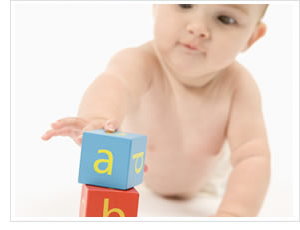Why teach early?

Studies have shown that it is much easier to acquire language skills early in life than at any other time. Very young children naturally learn language simply through continuous exposure. Young children can learn two languages from birth just as easily as they can learn one.
It is our belief that children can likewise acquire the ability to read - in more than one language - simply through consistent exposure to the written word.
And unlike at school-age, when learning to read can prove a headache for many children, learning to read as a baby is as natural and effortless as learning to speak one's native language.
Since reading is one of the most important skills a child will ever learn, we would encourage parents to begin teaching their baby to read from the age of 4 months, or as early as possible.
Children who develop their language skills - and particularly, the ability to read - before starting school have higher self-esteem than their peers. These children are also more likely to enjoy school-based learning, as they have been equipped with the right basic tools early in life.
For more on teaching your baby to read, go to the Reading section. To see videos of babies reading, go to Baby Reading Videos.
You can also begin teaching your baby math from the age of 4 months, and if you do so, you will have the opportunity to give your child an intuitive understanding of this core subject.
This is because - up to the age of three and a half - small children perceive the world largely through the dominant right hemisphere of their brain (the left hemisphere becomes increasingly dominant thereafter). Small children can perceive the number of dots on a flash card without counting them, just as some savants can. This gives children the ability to truly understand, say, what 48 is versus 49. By retaining this ability to perceive quantity, even after their left brain begins to assume dominance, children can perform seemingly complex mathematical equations without a calculator. (For the rest of us though, numbers will have to remain abstract concepts, with a calculator almost certainly required for tasks such as multiplying two three-digit figures.)
For more on teaching your baby math, go to the Math section.
You would also not want to neglect your baby's artistic education - and where better to begin than with music? All babies naturally enjoy rhythm and melody - even before birth (just ask any mother who's felt her baby kick to certain tunes).
What you may not know, however, is that it's possible to teach your baby to have perfect pitch, provided you start early enough (sorry, but just like with right-brain math, we adults are too old to learn!).
Learning music is a lot like learning languages - it's a whole lot easier when you start young. And the sheer act of learning a musical instrument has profound sculpting effects on the brain. Musicians have been shown to have a larger than average corpus callosum (a fiber bundle that connects the brain's left and right hemispheres) - believed to produce enhanced synchronization between the two halves of the brain. What's more, brain regions responsible for movement planning and execution, as well as regions responsible for hearing, have been found to be larger in musicians than non-musicians.
